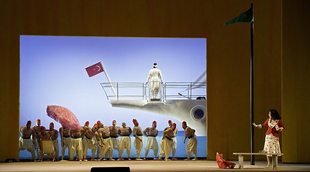 © DR
© DR
As the curtain falls on Moshe Leiser and Patrice Caurier’s Madama Butterfly, the Royal Opera House swaps tragedy for comedy with the second revival of the same directors’ 2005 production of Il turco in Italia.

Rossini’s thirteenth opera of 1814 is a comedy of errors involving a series of love triangles between various Turkish and Italian characters. The added twist is that many of these ‘errors’ are deliberately engineered by the poet Prosdocimo as he searches for material for his play.
Set in Naples, it sees Zaida lament the loss of her fiancé, the Turkish prince Selim, only to discover that he has actually come to Italy. Meanwhile the middle-aged Don Geronio is having trouble with his younger wife Fiorilla who readily proclaims that she is entirely fickle with her affections. Needless to say, when Fiorilla and Selim subsequently meet and get together it is to the consternation of Zaida, Don Geronio and her former lover, Don Narciso. Prosdocimo sets about manipulating events to generate operatic material, but just when things start to spiral a little too much out of control, he succeeds in bringing everything to a happy conclusion that also carries a moral message.
It is fairly common today to set operas in the 1950s for one predominant reason. The period is still recent enough to retain a certain air of familiarity, but also ‘historical’ enough to maintain many of the traditional values and hierarchies that the works originally played on.
In the case of Il turco this choice of decade helps to make the production colourful, and every last ounce of wit is squeezed from the scenario without the characterisation or singing ever being compromised. Every aspect is designed to heighten the exuberant effect, with the set consisting of layers of colourful interlocking rectangles that frame the drama, and luxury yachts, Vespas, bubble cars and green taxis frequently gracing the stage.
Individually, the cast members are of the highest calibre and when they are put together the results are as explosive as the picture of Vesuvius that hangs above Fiorilla’s bed. At the centre stand Aleksandra Kurzak’s Fiorilla and Ildebrando D’Arcangelo’s Selim. These singers have paired up in many operas (as well as in the previous revival of Il turco) and every time they do so they create a strong chemistry entirely befitting of the relationship in question. When they played Susanna and Figaro in Le nozze di Figaro at Covent Garden in 2008 and 2012 they gave the impression of a couple who knew each other inside out, and were always ready to stand up to, or conversely rescue, each other.
Here, in contrast, as we witness interactions such as the pair clasping each others’ hands whilst remaining at arms length, we realise that these are two people who act out of a love for themselves as much as for each other. Kurzak’s soprano has a glistening purity and strength that sees soaring phrases tackled with beauty and clarity, while D’Arcangelo’s bass-baritone is strong, even and highly pleasing to the ear.
Alessandro Corbelli is an old hand at playing such comedy roles as Don Geronio, and his comic timing as he laments his wife’s disloyalty by sticking his head in a bowl and fights a duel with a fork full of spaghetti is impeccable. In one highly amusing bedroom scene, he and Barry Banks’s splendid Don Narciso, played here as a teddy boy, act as the perfect counterbalance to Kurzak and D’Arcangelo’s own interaction. They may be rivals for Fiorilla’s affections, but even as they lament the existence of competition, they end up consoling each other at the end of the bed.
Luis Gomes is an excellent Albazar while as Prosdocimo Sir Thomas Allen proves a brilliant actor as he strategically intervenes in the unfolding drama. Rachel Kelly is possessed of a beautifully burnished mezzo-soprano and her portrayal of Zaida feels effortless. In the pit Evelino Pidò extracts playing of immense beauty, precision and evenness from the Orchestra of the Royal Opera House. If anything this account of the score is slightly understated but that is hardly a criticism, and there is never a sense in which any of the music’s exuberance or bubbly charm is being sacrificed.
Rossini’s Il turco in Italia is simply too light-hearted to make for a profound operatic experience in the same way that Madama Butterfly can, but that does not stop it from being immensely clever, and when one considers the standard of this production’s singing, playing, acting and staging it is hard to picture it being presented any better.
By Sam Smith
Il Turco in Italia | 11 – 27 April 2015 | Royal Opera House, Covent Garden
the 13 of April, 2015 | Print
Comments